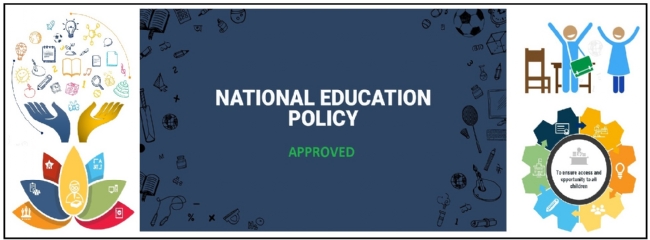New Delhi: Implementation of a new curriculum, assessment pattern and new Board exam patterns for class 10 rolls out from 2022-23 and for class 12 from 2024-25, said the National Education Policy 2020, which was approved by the union cabinet on July 29, Wednesday.
Similarly, the implementation of new assessment pattern for Class IX will roll out from the 2021-22 session and Class XII from the session 2023-24. The phase-1(1 year of pre-primary school and the 3-month preparatory module for Class -I students) of the Early Child Education will be implemented from 2021-22 session and phase-2 (Expansion of 1 year of pre-primary school through primary schools and Anganwadis) will be implemented from 2023-24 session.
The timeline for implementing the National Education Policy 2020:
2021-22: Formulation National Curricular Framework for School Education (NCFSE), National Curriculum Framework for Teacher Education
2022-23: A common guiding set of National Professional Standards for Teachers (NPST) and teachers will be prepared for a transformation in the assessment system
2024-25: Attaining universal foundational literacy and numeracy in all primary schools for all learners by grade 3, State/UT governments to optimize resources through mechanisms to a group or rationalize schools, such as school complexes, At least 50% of learners exposed to vocational education in the school and higher education system
2029-30: Universal provisioning of quality early childhood development, care, Only educationally sound, multidisciplinary, and integrated teacher education programmes shall be in force and all TEIs will be converted into multi-disciplinary institutes, Teacher education will gradually be moved into multidisciplinary colleges and universities, with minimum degree qualification 4-year B.Ed.
2040: Policy is fully operational following this a comprehensive review will be undertaken
Moreover, setting-up of National Center for Performance Assessment, Review and Analysis of Knowledge for Holistic development (PARAKH) will monitor the shift towards competency-based assessments, and promote critical and creative thinking aligned to the 21st century in classrooms. The major objectives of PARAKH would be setting norms, standards and guidelines for assessment and evaluation, guiding the State Achievement Survey (SAS), conducting the National Achievement Survey(NAS), monitoring achievement of learning outcomes in the country.
An Academic Bank of Credit (ABC) shall be established which would digitally store the academic credits earned from various recognized HEIs so that the degrees from an HEI can be awarded taking into account credits earned.
Vocational education will be integrated into all schools i.e. from Class VI with internships and higher education institutions in a phased manner over the next decade.
BVoc degrees introduced in 2013 will continue to exist, but vocational courses will also be available to students enrolled in all other Bachelor’s degree programmes, including the four-year multidisciplinary Bachelor’s programmes. ‘Lok Vidya’, that is, important vocational knowledge developed in India, will be made accessible to students through integration into vocational education courses.
The policy also aims towards the integration of Adult Education Centres (AECs ) with HEIs and other public institutions. The Adult Education Curriculum will be inclusive of foundational literacy and numeracy, critical life skills, vocational skills development, and basic education.
Children with special needs will be integrated into the regular schooling process from elementary to higher education levels. NIOS will develop high-quality modules to teach Indian Sign Language which will be standardized across the country. Technology-enabled assistive devices/tool for CWSN and orientation of the tools/devices for parents/caregivers.
The role of Government Departments/Bodies/Institutions in implementing the policy:
- Setting up State School Standards Authority(SSSA): Self-disclosure of all the basic regulatory information of all schools at SSSA and School website
- State Department to look after policymaking Directorate of Education to look after operations,
- SCERT to look after academics and State School Standards Authority to set minimum common standards for online self-disclosure by all public and private schools
- A random sampling of students for continuous online feedback on self-disclosure by schools
Engagement of social workers, alumni, retired teachers and volunteers with schools - Strengthening the Central Advisory Board of Education (CABE) for developing, articulating, evaluating and revising the vision of education on a continuous basis in collaboration with MHRD and corresponding apex bodies of States
NEP 2020 has been formulated after an unprecedented process of consultation that involved nearly over 2 lakh suggestions from 2.5 lakh Gram Panchayats, 6600 Blocks, 6000 ULBs, 676 Districts. In June 2017 a ‘Committee for the Draft National Education Policy’ was constituted under the Chairmanship of eminent Scientist Padma Vibhushan, Dr . Kasturirangan, which submitted the Draft National Education Policy, 2019 to the Human Resource Development Minister on May 31, 2019.


Comments are closed.